The reality of living in Ibiza: Workers sleeping in vans due to high cost of rent
Rampant speculation and massive high-budget tourism have pushed housing prices to unsustainable limits. There is a shortage of civil servants, including law enforcement officers, while hospitals are transforming wings into residences to retain fleeing doctors and nurses
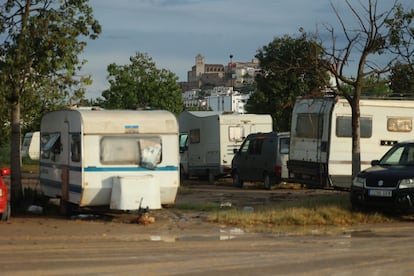

His caravan is sitting right around the corner from a Ikea store, in an open-air parking lot. The place is called Es Gorg, and from here you can see the beautiful silhouette of Ibiza’s old town at sunset, with its castle at the top. At this time, less than five minutes by car from here, there is already a line of beautiful people waiting to enter the trendy nightclub Lío. The owner of the caravan, who prefers not to see his name in print because he is embarrassed, leans against a tree and tells his story, which is the story of just about everyone who is living in this parking lot.
“I’m 37 years old. I do maintenance work for a luxury villa that is owned by some English people. I earn between €1,500 [$1,600] and €1,800 [$1,900] a month, depending on overtime, and I’m on a valid contract. I’ve been on the island since 2017. I like it. But since February, when I lost my house because my rent was raised, I haven’t found anything suitable. Landlords want €900 [$960] to €1,000 [$1,070] a month for a room. Not only that: they also want several months’ worth of deposit. In total, almost €4,000 [$4,200] or €5,000 [$5,340]. I don’t have it. That’s why I bought a caravan. I take a shower at a friend’s house. This parking lot is quiet. There are no fights, just working people. Maybe in September, when the tourist season passes, I’ll try again. But if it doesn’t work out, there’s always this. I asked the English couple if they would let me park the caravan at the back of the villa’s garden, but they said no.” Around this spot there are dozens of caravans and motorhomes.
Next to this man’s caravan there is another one that is home to an office worker who earns €1,000 a month. A little further on is the van of a waiter who earns €1,500 and to the right, the motorhome of a hospital worker who also earns €1,500 and who bought the vehicle years ago. His name is José Luis Gambacorta and he is the only one who does not mind giving out his name and having his picture taken. The rest do not like to admit that they do not have a house to sleep in when they return from work.
Welcome to Ibiza and its two parallel worlds, the one that contains of the Lío nightclub, where the minimum expenditure is €270 ($280) per person, and the world of life in a van.
On this popular Spanish Mediterranean island, growing numbers of wealthy tourists in combination with real estate speculation (which corrodes everything from luxury developments to the dingiest rental rooms) have made the price of housing soar, making it unaffordable for a good portion of the army of workers who make sure that the machinery that sustains this summer paradise remains well oiled.
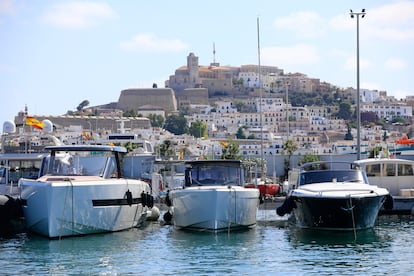
According to Spanish Transportation Ministry statistics, the most expensive square meter of real estate in Spain in municipalities with more than 25,000 inhabitants is located in the Ibiza town of Santa Eulària des Riu, in the northeast of the island, and it costs €5,194 ($5,550). Second on the list is the city of Ibiza, at €4,624 ($4,940). The Basque coastal city of San Sebastián is next at €4,378 ($4,675) per square meter. In Madrid, a square meter is going for €4,015 ($4,287) and in Barcelona it is €3,767 ($4,023). To get an idea of the meteoric rise in prices, it is worth knowing that the same square meter in Santa Eulària des Riu, in 2010, used to cost €2,291 ($2,446) while in Ibiza it was €1,297 ($1,385). In Madrid, at that time, the value was €2,375 ($2,536).
Furthermore, these statistics do not reflect the enormous pressure suffered by the island’s residents. To get a feel for that, it is better to visit a real estate agency in the center of Ibiza. There, a one-bedroom apartment on Paseo de Ses Figueretes, next to the sea, which last year cost €800 ($850) a month, is now going for €2,500 ($2,670). “It will only get rented during what we call ‘the season,’ from May to September, but it’s worth it for the owner,” says the head of the real estate agency. This crazy rental market moves through Telegram channels that are constantly updated. There you can find rooms for €1,000 (plus a month’s deposit), or beds in a shared room at €550 ($587) per month, or rooms for couples in shared country houses at a rate of €1,500 per month. However, the more desperate ads are those placed by people who are seeking accommodation. Last year, more than 3,385,000 tourists visited an island that has around 160,000 registered residents. That was 300,000 more visitors than in 2022, according to data from the Balearic Institute of Statistics. And nothing indicates that fewer visitors will come this year.
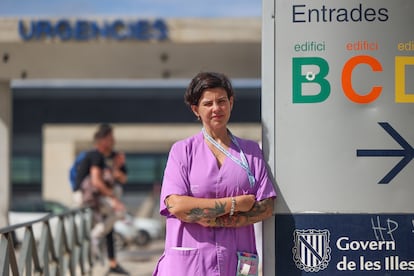
One person who is definitely leaving is Sonia Sancho. She was born on the island 35 years ago, and works on a permanent contract as a nursing assistant at Can Misses Hospital in Ibiza, earning between €1,800 and €2,000 a month. In autumn she is moving to the Spanish mainland, to a place called Valdepeñas in the un-touristy province of Ciudad Real. She started thinking about it when her daughter was born six months ago. The small one-bedroom apartment that she and her partner were renting out (he earns about €1,000) and for which they pay €900 a month was no longer good enough for the three of them. They searched the entire island, but did not find anything with two rooms for less than €1,800. And that price, as Sonia explains, condemns them to a life of poverty. To not having any vacations. To not being able to sign up her daughter for extracurricular activities. “And I don’t want to be poor,” she says.
The day she made the decision to leave she cried, because Ibiza is where she has her life, her friends, her mother and her childhood. By explaining her reasons on television and on the radio, she has become a minor celebrity for the locals who feel trampled by their own island. Sancho even wrote a personal message to Mayor Rafael Triguero in which she said the following: “I was born here, I grew up here, I studied here and I sat my public service examinations here. I work in the Emergency Department in Can Misses and, unfortunately, I have requested a transfer to Valdepeñas. In two months, I will have to leave because I cannot find a decent home for my baby.” The mayor replied: “Sonia, I assure you that I feel deep pain at what you are explaining to me. Every day I receive people in similar situations, and I assure you that I am/we are working conscientiously to minimize this dramatic state of affairs.”
Paloma Garzón, 25, is also a nurse with a permanent position at Can Misses. Yet she will be leaving soon too. The €2,400 ($2,560) she earns a month is not enough for her to move out by herself and she is tired of sharing an apartment. One of her roommates is a dentist and the other one is a police officer. Each one pays €600 for a room in an aging apartment in which the owner has not changed the furniture even once in many years. Paloma says that in the three years she has been in Ibiza she has already moved five times. “I don’t even take things out of the boxes anymore,” she explains. She will go to the Netherlands, where, in addition to earning more, they will offer her housing.
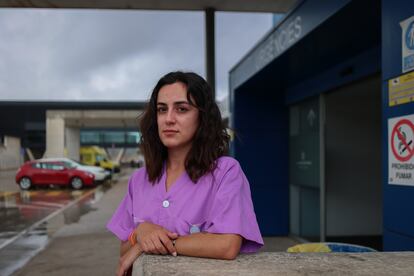
In Ibiza there are primary school teachers who became famous at the beginning of the school year because they come and go every day by plane from Mallorca and thus avoid having to sleep — and pay for a room — on the island. And there are rental car cleaners at the airport with their papers in order and a salary of €1,500 who live, during the summer season, in tents in an open field, like homeless people or refugees, because they cannot find anyone to rent them a room for less than €500.
There are endless stories about families who are left homeless because their rent is suddenly raised by 50%. Scams, abuses and exaggerations abound: on a private piece of land near the city of Ibiza called Can Rova, the owners let you build an illegal shanty without any type of papers or registration rights, or to place your caravan there for €500 a month with the right to electricity and water. The authorities have announced that they will vacate the camp on July 10 and with it, the dozens of people who live there illegally. Last week, a couple was leaving by car. He works in construction for €1,500 a month, while she brings home the same paycheck as a cleaner at the Ushuaia nightclub, which is sometimes visited by Leonardo di Caprio. They don’t know where they will go.
Every year there are Civil Guard trainee officers who arrive in Ibiza for the summer, as well as agents transferred to reinforce the law enforcement agency during the high season, and some of them end up sleeping in vans or caravans, according to Iván Fidalgo, coordinator of the Spanish Association of Civil Guards of the Balearic Islands and a resident of Ibiza. He also says that there are always unfilled positions because no one wants to come to Ibiza. Sabino Aramburu, spokesperson for the Independent Trade Union Center and Civil Servants (CSIF) has a list of departments that lack staff: the Traffic bureau staffers, driver’s license examiners, police station officers in charge of processing national ID cards, Employment Office workers... “And the people who do come, leave as soon as they can, so that we spend our lives teaching the newcomers. And it’s all because of the price of housing. In the Canary Islands they get a €500 bonus for being stationed on an island. Here [in the Balearic Islands] it is €80,” he adds.
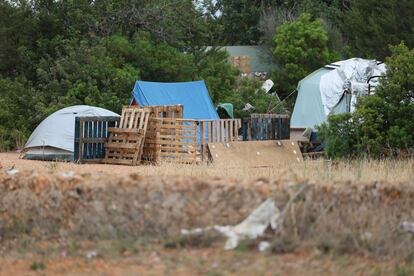
Everyone here plays the speculation game: it’s not just the investment funds that buy up entire buildings. It’s also the individual who owns a little piece of land and rents it without permission so that someone can put up a caravan for €700 ($750) a month plus deposit, or the person who illegally rents out his bed for the night to get some extra cash in the summer. The real estate bubble keeps growing because everyone keeps blowing on it. A case in point: a young woman who prefers not to give out her name says that “the owner of the three-bedroom apartment where I live in the city of Ibiza is renting it out to a woman, who we will call Rosa, for €1,200 a month. It’s very cheap, really. Rosa is subletting two of the rooms, one to a friend and the other one to me, for €500 each. And sometimes she rents out her own room for €120 a night and goes to sleep in the living room. The owner doesn’t know anything. But the day she finds out, she will kick us all out and rent out the rooms herself to get all the money that Rosa is now making.”
The Can Misses Hospital, where Sonia Sancho and Paloma Garzón will keep working until they leave, has enabled an unused wing of the building, converting the empty rooms of the former patients into individual rooms to accommodate, free of charge, the doctors and nurses who arrive in summer and have nowhere to go. They started with eight rooms years ago. Now there are 42. The plan is to build an entire residence in a neighboring building.
The general director of Housing and Architecture of the Balearic Islands regional government, José Francisco Reynés of the center-right Popular Party, says that in addition to trying to accelerate the construction of subsidized housing on all the islands, specific measures have been implemented in Ibiza: allowing residential buildings to be erected in zoning areas where only hotels could be built, in order to house the workers of those hotels; coordinating agreements between hotels and regional departments so that the former can offer subsidized accommodation to teachers and doctors. Reynés acknowledges that these are medium to long-term initiatives and he appeals to Ibizans’ collective conscience: “This is not just a problem for politicians. It also applies, for example, to those who illegally rent a home. You are contributing to the fact that tomorrow, for example, your child will not have a teacher or your street will not have a police officer.”
Sonia Iglesias, Amelia González and Daniel Granda belong to the Ibiza Tenants Union. They have come together to defend themselves against landlords who want to evict them, to jointly hire defense lawyers, to litigate together, to exchange information about real estate rights and laws and, many times, simply to meet and chat. They feel like they are inhabitants of the future and have a warning for everyone else: “What is happening in Ibiza now could happen in other parts of Spain in a few years.”
Precisely in order to avoid this scenario, the city of Barcelona decided on June 21 that it will eliminate its 10,000 short-term rentals within five years. Iglesias and the others complain above all about the progressive degradation of their standard of living, based on paying more expensive rent each time the lease ends. On a recent afternoon, sitting in a bar in Santa Eulària des Riu, they were accompanied by a sad-looking middle-aged woman with dark glasses who, like many others on the island, was obsessing about the looming date when her lease will end and she will have to renegotiate with the landlord. Maybe she’ll end up losing her place. She thought about that and uttered a phrase that illustrates the two increasingly separated worlds that coexist in Ibiza: “Here, either you are very rich or you become impoverished.”

Sign up for our weekly newsletter to get more English-language news coverage from EL PAÍS USA Edition
Tu suscripción se está usando en otro dispositivo
¿Quieres añadir otro usuario a tu suscripción?
Si continúas leyendo en este dispositivo, no se podrá leer en el otro.
FlechaTu suscripción se está usando en otro dispositivo y solo puedes acceder a EL PAÍS desde un dispositivo a la vez.
Si quieres compartir tu cuenta, cambia tu suscripción a la modalidad Premium, así podrás añadir otro usuario. Cada uno accederá con su propia cuenta de email, lo que os permitirá personalizar vuestra experiencia en EL PAÍS.
¿Tienes una suscripción de empresa? Accede aquí para contratar más cuentas.
En el caso de no saber quién está usando tu cuenta, te recomendamos cambiar tu contraseña aquí.
Si decides continuar compartiendo tu cuenta, este mensaje se mostrará en tu dispositivo y en el de la otra persona que está usando tu cuenta de forma indefinida, afectando a tu experiencia de lectura. Puedes consultar aquí los términos y condiciones de la suscripción digital.








































